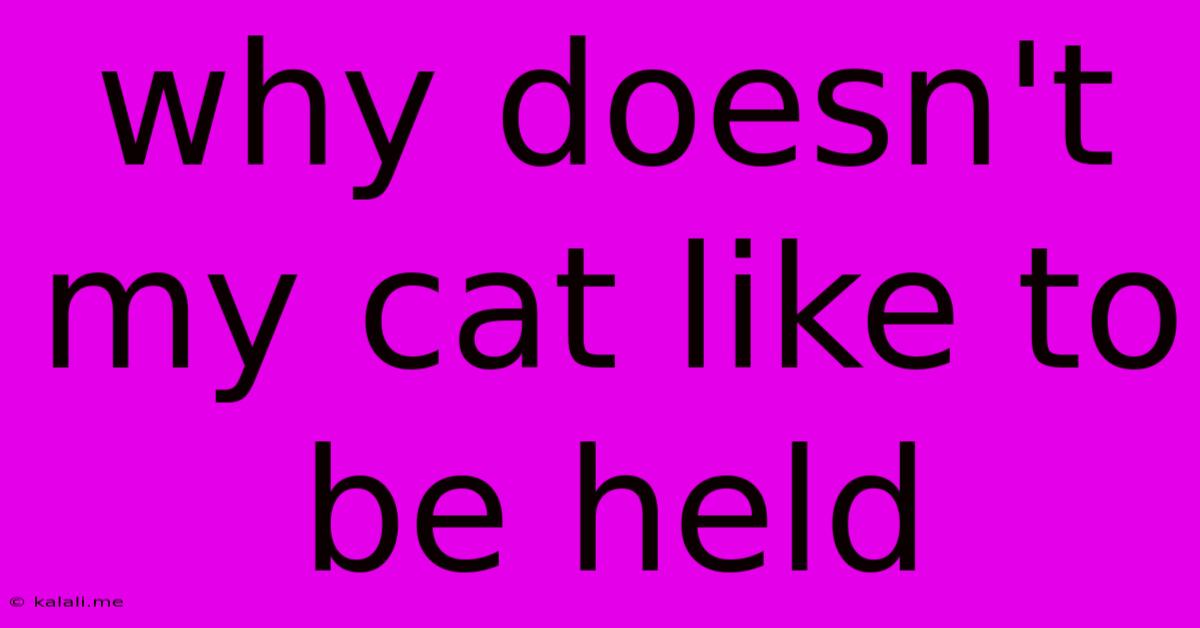Why Doesn't My Cat Like To Be Held
Kalali
Jun 04, 2025 · 3 min read

Table of Contents
Why Doesn't My Cat Like to Be Held? Understanding Feline Affection
Cats are famously independent creatures, and while some happily cuddle in your lap, others vehemently resist being held. This isn't necessarily a sign of dislike; it's often a matter of personality, past experiences, and understanding feline communication. This article explores the reasons why your cat might not enjoy being held and offers tips on building a stronger bond based on mutual respect.
Why Your Cat Might Not Enjoy Being Held:
Several factors contribute to a cat's aversion to being held. Understanding these can help you adjust your approach and build a more positive relationship:
1. Personality and Breed:
Just like humans, cats have individual personalities. Some are naturally more affectionate and tolerant of physical contact, while others are more independent and prefer their personal space. Certain breeds, known for their independence, might be less inclined to cuddling than others. Consider your cat's inherent personality – forcing affection will likely backfire.
2. Past Negative Experiences:**
A traumatic experience, such as a forceful handling by a previous owner or a frightening encounter, can severely impact a cat's comfort level with physical touch. If your cat has a history of negative interactions, patience and a gradual approach are crucial.
3. Stress and Anxiety:**
Cats can experience stress from various sources, including environmental changes, new pets, loud noises, or even unfamiliar people. When stressed, a cat might become less receptive to physical affection as a self-preservation mechanism. Recognizing and addressing underlying stress is key.
4. Body Language Misinterpretations:**
Humans often misinterpret feline body language. While a purring cat might seem content, it could also be a sign of stress or anxiety. Other indicators of discomfort include flattened ears, a tucked tail, dilated pupils, and hissing or growling. Respecting your cat's cues is paramount.
5. Physical Discomfort:**
Underlying health issues, such as arthritis, pain, or injury, can make a cat less tolerant of being held. If your cat suddenly shows aversion to being held, consider a veterinary check-up to rule out any physical problems.
6. The "Holding" Technique:**
The way you hold your cat significantly impacts its comfort level. Holding a cat too tightly, restricting its movement, or picking it up incorrectly can cause fear and distress. Learn how to gently lift and support your cat, providing a secure but comfortable hold.
Building a Stronger Bond:
Instead of focusing on holding, prioritize building trust through positive interactions:
- Respect their space: Allow your cat to approach you at its own pace.
- Offer gentle strokes: Start with short, gentle strokes on areas your cat enjoys, such as under the chin or behind the ears.
- Positive reinforcement: Reward your cat with treats or praise when it tolerates petting.
- Interactive play: Engaging in play sessions builds confidence and strengthens the bond.
- Observe their body language: Pay close attention to your cat's signals and respect their boundaries.
In Conclusion:
A cat's aversion to being held isn't necessarily a sign of dislike. It's crucial to understand the underlying reasons and respect your cat's preferences. By focusing on building trust, respecting their boundaries, and understanding their communication, you can create a positive and fulfilling relationship based on mutual respect. Remember, patience and understanding are key to building a strong bond with your feline companion.
Latest Posts
Latest Posts
-
Can I Use A Godox Transmitter With A Neewer Flash
Jun 05, 2025
-
Should I Get A Radon Test With Home Inspection
Jun 05, 2025
-
Why Cant I Type Special Characters In Minecraft
Jun 05, 2025
-
Where Is My Water Pressure Regulator
Jun 05, 2025
-
Can The Sun Be Used To Amplify Radio Waves
Jun 05, 2025
Related Post
Thank you for visiting our website which covers about Why Doesn't My Cat Like To Be Held . We hope the information provided has been useful to you. Feel free to contact us if you have any questions or need further assistance. See you next time and don't miss to bookmark.